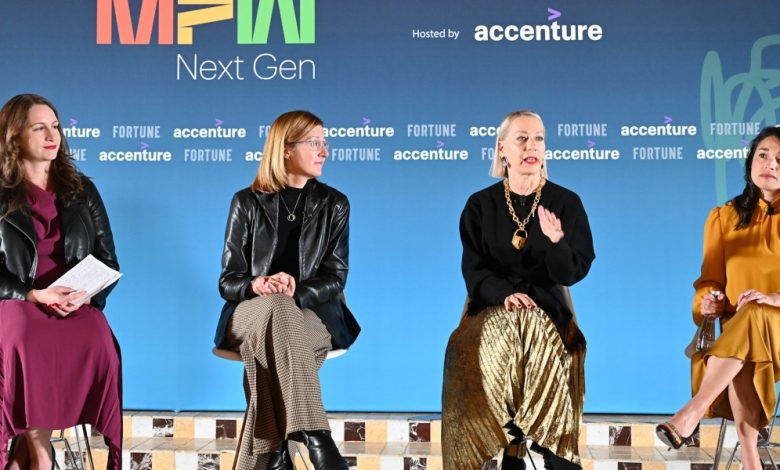Fortune MPW Next Gen: Creating a Continuous Learning Culture

Gerren is a Walmart employee who has struggled with her education. After graduating from high school, Gerren began taking college courses while employed as a front-line worker. But debt, work demands, and the pressure to make ends meet always took precedence over her education. Gerren’s college experience was very much a start-stop cycle.
She eventually began to believe that advanced learning wasn’t for her. Until she enrolled in Walmart’s debt-free learning program and eventually graduated.
This was just one of many stories shared on wealth‘s Most Powerful Women Next Gen Summit this week in San Diego, California for a panel discussion on continuous learning. The Accenture-hosted panel included Allison Horn, Global Lead of Talent Strategy and Development at Accenture; Melanie Rosenwasser, Chief People Officer at Dropbox; and Lorraine Stomski, senior vice president of associate learning and leadership at Walmart. It was Stomski who shared Gerren’s story while the panelists all talked about what their companies have done to foster a learning environment and what they still have to achieve.
Despite being part of very different companies, all three panelists expressed similar challenges working with thousands of — and in Walmart’s case, 1.6 million — employees spread across large geographic areas. How do you reach individual employees and enable them to take advantage of training and further education opportunities in addition to the daily demands of their work?
“One of those most important investments for us is time,” Accenture’s Horn said. “So make sure we’re not only saying the right things and putting the right things on the shelves, but also giving our employees time to invest in their own growth.”
She explained that the emphasis on time comes from the top down. It is not enough to have a leadership team posing as learners, but to make continuous learning part of everyday employee life. This means that middle management has a tremendous impact on the success of large-scale programs.
At Dropbox, “growth mindset” is actually a core competence of all employees, said Rosenwasser. Managers have a responsibility to support their employees in this endeavor, but also to acknowledge completion to create a positive feedback loop. So does failure—the ability to apply lessons learned from big hits and failures. “It’s really the whole ecosystem,” she added.
While companies like Walmart have had great success with their debt-free school option, which promotes graduates twice as fast as non-graduates, that doesn’t mean companies have to spend large sums of money to run training programs. Horn shared the 70-20-10 applied learning model: 10% training, 20% collaboration, and 70% application. She noted that so much learning happens on the job as long as you do it on purpose, and free programs like Coursera offer courses without hefty fees.
Then, of course, there is coaching – be it from a manager, a colleague or another specialist across disciplines, says Rosenwasser.
“We have community ambassadors who are actually tasked with creating events to bring people from different teams together,” Rosenwasser said. “There is a world of learning that can come from talking to peers and expanding mentoring networks.”
Sign up for the Fortune Features Email list so you don’t miss our biggest features, exclusive interviews and investigations.



